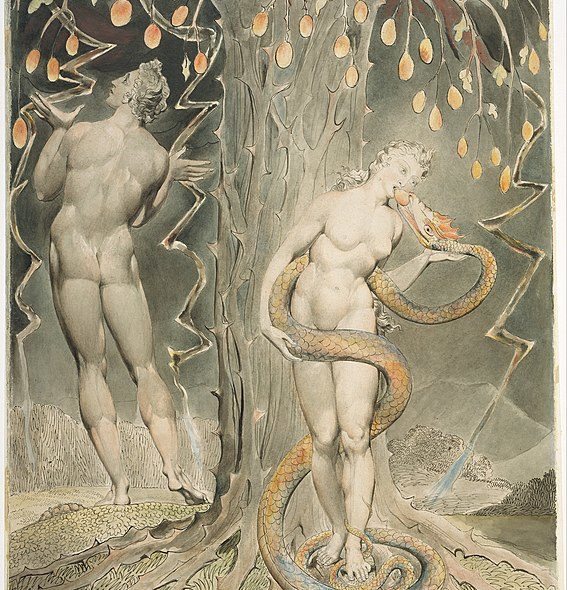Translation into Spanish of Paradise Lost, first part of Book I. Paradise Lost is an epic poem in blank verse (poetry in regular metrical but unrhymed lines) written by the 17th century English poet John Milton (1608–1674). The first version, published in 1667, consists of ten books with over ten thousand lines of verse. The poem “tells the story of the war for heaven and of man’s expulsion from Eden. Its dozen sections are an ambitious attempt to comprehend the loss of paradise – from the perspectives of the fallen angel Satan and of man, fallen from grace. Even to readers in a secular age, the poem is a powerful meditation on rebellion, longing and the desire for redemption. Milton’s Paradise Lost is rarely read today. But this epic poem remains a work of unparalleled imaginative genius that shapes English literature even now.” Reference and further information on this article.
Paradise Lost
Of Man´s First Disobedience, and the Fruit
Of that Forbidden Tree, whose mortal taste
Brought Death into the World, and all our woe,
With loss of Eden, till one greater Man
Restore us, and regain the blissful Seat,
Sing Heavenly Muse, that on the secret top
Of Oreb, or of Sinai, did inspire
That Shepherd, who first taught the chosen Seed,
In the Beginning how the Heavens and Earth
Rose out of Chaos: Or if Sion Hill
Delight thee more, and Siloa’s Brook that flowed
Fast by the Oracle of God; I thence
Invoke thy aid to my adventurous Song,
That with no middle flight intends to soar
Above the Aonian Mount, while it pursues
Things unattempted yet in Prose or Rhyme.
And chiefly Thou O Spirit, that does prefer
Before all Temples the upright heart and pure,
Instruct me, for Thou know; Thou from the first
Was present, and with mighty wings outspread
Dove-like sat brooding on the vast Abyss
And made it pregnant: What in me is dark
Illumine, what is low raise and support;
That to the height of this great Argument
I may assert Eternal Providence,
And justify the ways of God to men.
Say first, for Heaven hides nothing from thy view
Nor the deep Tract of Hell, say first what cause
Moved our Grand Parents in that happy State,
Favoured of Heav’n so highly, to fall off
From their Creator, and transgress his Will
For one restraint, Lords of the World besides?
Who first seduced them to that foul revolt?
The infernal Serpent; he it was, whose guile
Stirred up with Envy and Revenge, deceived
The Mother of Mankind, what time his Pride
Had cast him out from Heav’n, with all his Host
Of Rebel Angels, by whose aid aspiring
To set himself in Glory above his Peers,
He trusted to have equaled the most High,
If he opposed; and with ambitious aim
Against the Throne and Monarchy of God
Raised impious War in Heaven and Battle proud
With vain attempt. Him the Almighty Power
Hurled headlong flaming from the Ethereal Sky
With hideous ruin and combustion down
To bottomless perdition, there to dwell
In Adamantine Chains and penal Fire,
Who dared defy the Omnipotent to Arms.
El Paraíso perdido
Estas líneas versan sobre la primera desobediencia del hombre y sobre la fruta de aquel árbol prohibido, cuyo sabor mortal trajo al mundo la muerte y todas nuestras penurias e hizo que perdiéramos el paraíso, hasta que un hombre superior pudo guiarnos nuevamente hacia tierras divinas. Canta, musa celestial. Y hazlo desde la cima secreta de Oreb o desde el Sinaí, donde inspiraste a aquel pastor, el primero que, durante el origen de la humanidad, les enseñó a los elegidos cómo fue que el cielo y la tierra se crearon a partir del caos. O bien, si lo prefieres, canta desde el monte Sion o desde las aguas de Siloé que fluían con rapidez junto al oráculo de Dios. Desde allí te invoco para que me ayudes con estos ambiciosos escritos, y no porque así pretenda sortear el arduo ascenso de la inspiración, sino porque deseo llevar la innovación hasta el límite y utilizar recursos que nunca antes se utilizaron ni en la prosa ni en la poesía.
Tú, oh, Espíritu, que valoras a un corazón puro y honesto más que a los templos, guíame, porque solo tú tienes la sabiduría. Estuviste presente durante aquel inicio, cuando desplegaste como paloma tus poderosas alas y te posaste sobre el extenso abismo para, así, dotarlo de vida. Por ello, te imploro ilumines las oscuridades que en mí habitan y levantes lo que en mí está desplomado. De esa manera, podré hacerle justicia a un tema de tal envergadura. Sí, solo así podré demostrar la existencia de la Divina Providencia y justificar los modos del accionar de Dios ante los hombres.
Antes que nada, ya que tú puedes ver todo lo que hay en los cielos y en las profundidades oscuras del infierno, dime por qué nuestros ancestros, quienes disfrutaban de una vida tan plena y tenían la bendición del Altísimo, deciden alejarse de su Creador y desobedecer sus órdenes, su única ley, cuando ellos eran entonces los reyes del mundo.
¿Quién los sedujo para que consumaran rebelión tan aborrecible? La serpiente del demonio. Sí, fue ella: su malicia, incitada por la venganza y la envidia, logró engañar a la madre de toda la humanidad. Tiempo atrás, había sido el orgullo de dicha serpiente lo que terminó por desterrarla del paraíso junto con su ejército de ángeles rebeldes, con cuya ayuda planeaba establecerse como el ser superior de los cielos. Hasta pensó que podría ocupar el lugar de Dios si se enfrentaba a él. Y cegada por la ambición, comenzó en el cielo una guerra impía contra el trono y la monarquía de Dios. Luchó con orgullo, pero en vano. El omnipotente poder del Supremo la hizo arder y caer desde los cielos etéreos, en llamas y sumida en la perdición. Y cayó hasta las profundidades más bajas del infierno, para vivir allí sujetada por cadenas imposibles de romper y atrapada entre las rejas de un fuego abrasador. Eso, por haberse atrevido a enfrentar al Todopoderoso.

